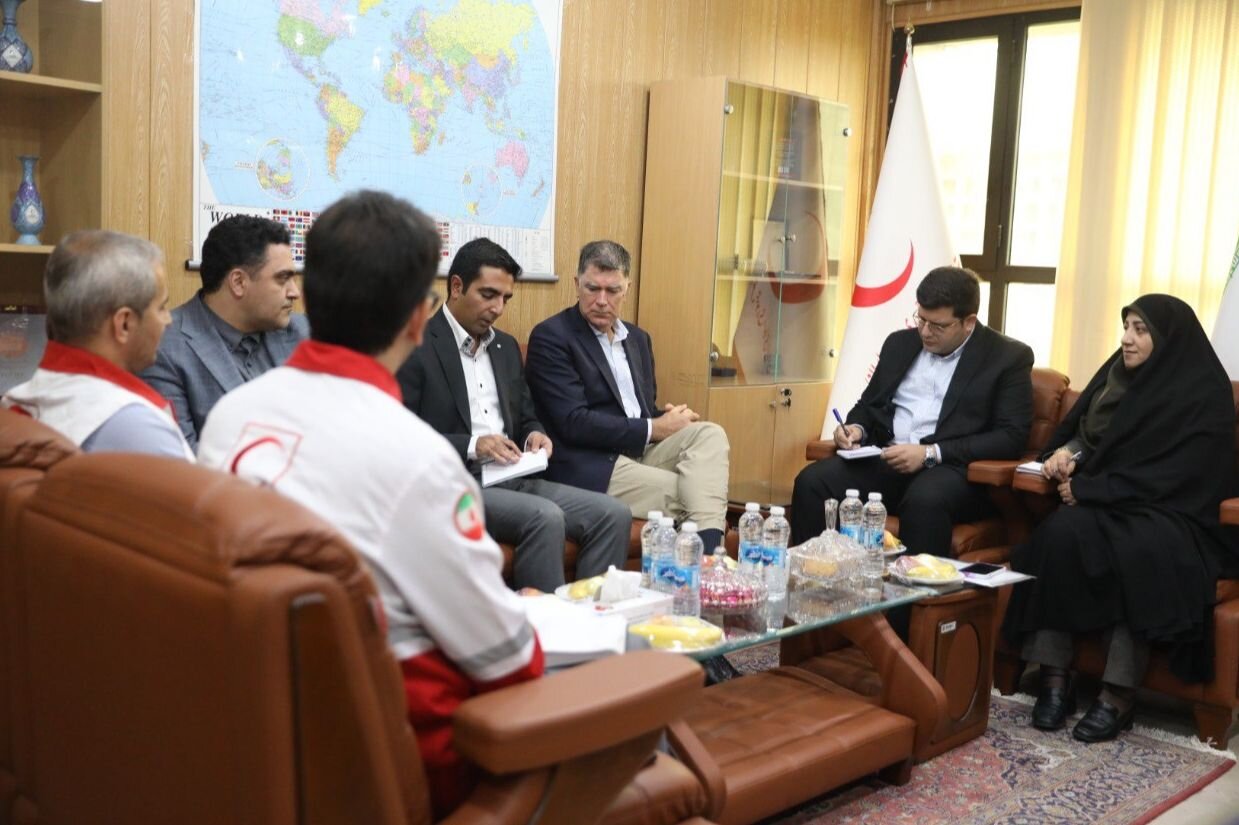IRCS, ICRC aim to bolster co-op in rehabilitation sector

TEHRAN –The Iranian Red Crescent Society (IRCS) and the International Committee of the Red Cross (ICRC) have highlighted the significance of maintaining collaborations and enhancing cooperation in the field of rehabilitation.
Holding a meeting on Saturday, Razieh Alishvandi, the IRCS director for international affairs, and Vincent Cassard, representative of the ICRC in Iran, discussed potential ways to boost cooperation.
“Holding courses in mine risk education, reuniting families, supporting refugees, and international humanitarian law serve as great avenues for fostering cooperation,” IRCS quoted Alishvandi as saying,
“We are interested in maintaining and boosting joint activities, but the current focus of the Iranian Red Crescent Society is on strengthening cooperation in the field of rehabilitation, the official stated.
The Iranian Red Crescent Society has more than 200 active rehabilitation centers nationwide. Accordingly, screening patients with musculoskeletal disorders is on the agenda to identify the patients and prevent these problems, she highlighted.
Cassard, for his part, lauding the IRCS efforts in various fields, said, “The International Committee of the Red Cross is ready to cooperate with the Iranian Red Crescent Society in all sectors.”
Cassard went on to extend an invitation to the IRCS, in recognition of its outstanding activities in the field of rehabilitation, to attend and cooperate in the international rehabilitation conference.
In June, the IRCS and the ICRC discussed ways to enhance rehabilitation services for vulnerable and disabled individuals in Zahedan, the capital of Sistan-Baluchestan.
During a meeting on June 13, Alishvandi and Cassard visited the rehabilitation center in Zahedan, the IRCS website reported.
Visiting the center, Alishvandi reviewed the joint rehabilitation project which in collaboration with the ICRC aims at providing physical rehabilitation services to migrants in need as well as vulnerable citizens in the cities of Zahedan, Iranshahr, Chabahar, and Zabol in Sistan-Baluchestan province.
Based on the agreement, physical rehabilitation services have been provided in Sistan-Baluchestan province since the Iranian year 1398 (2018-2019).
“Currently, the Iranian Red Crescent Society operates rehabilitation centers in all 31 provinces; they offer a wide range of services to individuals with physical disabilities as part of its program,” Alishvandi stated.
The ICRC funds physical rehabilitation programs for vulnerable and disabled individuals, both Iranians and Afghans in Sistan-Baluchestan province.
The support covers the costs of various services and supportive devices such as prostheses, orthotics, physiotherapy, special shoes, wheelchairs, canes, and walking aids.
The logistics department of ICRC purchases needed items either from Sistan-Baluchestan (in case available) or Tehran provinces.
Ongoing training sessions and on-the-job support are provided during field visits to orthotists and prosthetists throughout the manufacturing process.
Moreover, the ICRC allocates a budget to cover the costs of the project, including human resources, building rent, and equipment required for conducting screening assessments.
In 2022, the Physical Demand Analysis (PDA) Institute, encompassing social workers and physiotherapists, evaluated the needs in three remote areas of Sistan-Baluchistan province namely Zabol, Iranshahr, and Chabahar.
Out of 490 potential service users initially identified, some 300 met the inclusion criteria.
Then the FDA team set up relief clinics in Zabol and Iranshahr to provide services to the identified disabled people. Chabahar clinic also started operating in 2024.
Joint program
The IRCS and the ICRC in Iran are conducting joint programs to address the challenges facing Afghan refugees and vulnerable Iranians residing in Golshahr district in Mashhad, northeastern Khorasan Razavi province.
"The initiative to provide primary health and rehabilitation services to Afghan immigrants and residents of Golshahr district is part of the joint program," IRNA quoted Alishvandi as saying in May.
Based on the memorandum of understanding (MOU) that was signed in the Iranian calendar year 1392 (2013 –2014), IRCS and ICRC agreed to support the rehabilitated refugees.
The mine awareness project aims to raise public awareness of the dangers of mines and unexploded ordnance left over from the war, especially in six provinces namely Kordestan, Kermanshah, Ilam, West Azarbaijan, Khuzestan, and Khorasan-Razavi, Alishvandi said.
The project also includes increasing foreign nationals' awareness of landmine dangers while returning to their home country through shared borders.
Considering the mission of the ICRC in educating and promoting international humanitarian law during peacetime, the committee has had extensive collaborations with the IRCS and the secretariat of the National Humanitarian Rights Committee which are ongoing, the official mentioned.
A total of 30 provincial educational workshops have been held to familiarize the IRCS staff with the structure of the international movement and humanitarian rights. The workshops are scheduled to continue in the future.
MT/MG
